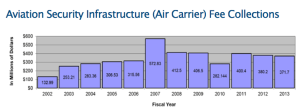Even as lobbying group Airlines For America (A4A) in December was rallying against the increasing number of taxes and fees the government levies on airline tickets by handing out airsickness bags brandishing the message “Are higher air taxes making you sick?”, it appears work was occurring behind the scenes to eliminate the Aviation Infrastructure Security Fee (ASIF) levied against airlines in the bipartisan budget deal that ultimately hiked the Transportation Security Administration (TSA) fees paid by the traveling public.
In late November A4A decried the TSA tax increase from $2.50 to $5.60 per one-way flight, estimating it would “cost passengers more than $730 million annually, placing a huge additional tax on the traveling public, with no direct benefit to those who pay it”.
While A4A was ultimately unsuccessful in its efforts to block the TSA fee increase, its lobbyists managed to squeeze two key concessions from lawmakers crafting the budget deal – the repeal of the ASIF, which according to to TSA estimates was nearly $372 million in fiscal 2013, and a pledge that TSA would maintain responsibility for monitoring exit lane areas at airports.
 Political publication The Hill newspaper listed the A4Aʼs victory in gaining those concessions, along with persuading lawmakers to find other funding sources to stop FAA furloughs resulting from sequestration, as one of the top lobbying victories of 2013.
Political publication The Hill newspaper listed the A4Aʼs victory in gaining those concessions, along with persuading lawmakers to find other funding sources to stop FAA furloughs resulting from sequestration, as one of the top lobbying victories of 2013.
Relaxing of the ASIF is certainly a relief for airlines; but passengers are still on the hook to pay more for air travel, which puts A4A in a delicate position. It prevailed in winning concessions that ease costs for its members, but fell short of reaping any benefits for the travelling public.
Perhaps the situation illustrates the give-and-take that occurs behind closed doors in Washington. In the end, A4Aʼs mandate is to drive benefits for its airline members. “The outcome, airlines skate on ASIF while passengers take a higher TSA fee hit — seems to illustrate well that ʻA4Aʼ means, foremostly Airlines for America,” says long-time industry consultant Robert Mann.
A4A still stresses that “airlines and our customers are overtaxed and we were disappointed that fees on air travel were increased in the budget bill”. However, the association also states it appreciated Congress eliminating the ASIF and the “recognition that exit lane staffing in airports is a federal security function. These two items items are critical to a more rational regime of regulations, taxes and fees and, we hope, the beginning of Congress considering additional reforms…”
Despite getting a break of out-of-pocket fees paid to TSA, some of A4A’s members are still grumbling about the TSA tax hike. United CFO John Rainey recently concluded that “for United alone, the net annual run rate impact from this increase is over $100 million.”
Ultimately as lobbyists continue their high-dollar bargaining, travellers continue to be squeezed, which ultimately pressures demand. “Whether directly imposed or passed along by airlines, higher out of pocket fares/taxes/fees destroy some air travel demand,” concludes Mann. “Shifting some to other travel modes, Amtrak and buses, or suppressing the intent to travel altogether.”










